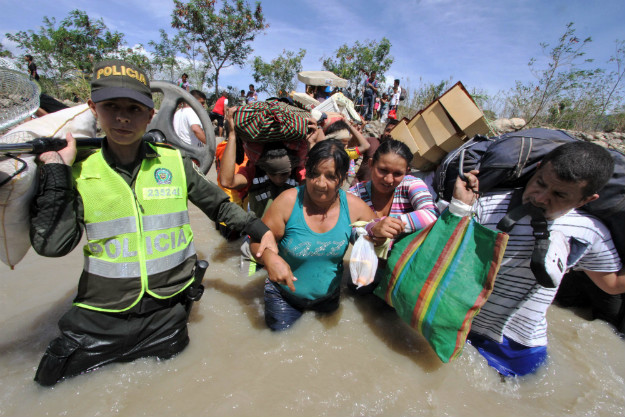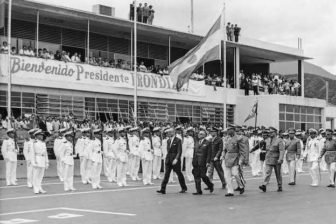Welcome to the Trump-ification of Venezuelan politics. By closing one of the busiest sections of the border with Colombia, and launching mass deportations of citizens from that country, the government of President Nicolás Maduro has actually implemented what the Republican presidential candidate only dreams of doing. Indeed, Maduro’s policies constitute a low point in the recent history of human rights violations in Latin America.
What is remarkable about these policies is how much they break with Venezuelan tradition. During most of the second half of the 20th century, Venezuela was Latin America’s most welcoming country for immigrants. In part because of its oil wealth, but also because of the generosity of Venezuelan citizens and leaders, Venezuela had some of the most pro-immigrant policies in the continent. Until the 1960s, Venezuela opened its borders to many Europeans fleeing war and hunger in Europe. During the 1960s and 1970s, Venezuela established the most welcoming policies for Latin Americans fleeing dictatorships, from rightwing military juntas (Argentina, Chile, Uruguay) to communist autocrats (Cuba). And to this day, Venezuela has remained quite welcoming of poor citizens from neighboring countries: Trinidad and Tobago, Guyana, Peru, Ecuador, and, of course, Colombia. In a continent better known in the world for exporting people, Venezuela was the exceptional people-importer.
Ethnic immigrants always coexisted peacefully. Most Venezuelans never had problems making deposits in Spanish-owned banks, buying bread from Portuguese-owned bakeries, watching soap-operas from Cuban-dominated media outlets, taking courses taught by Argentine college professors, or even working for Colombian bosses. As a non-Venezuelan traveling to Venezuela, I always marveled at Venezuelan hospitality. Some might have been curious about my non-Venezuelan Spanish accent, but that was the extent to which they would make an issue of my otherness.
I don’t want to idealize the way things used to be. Certainly, this diversity also produced its share of tensions, resentment, recriminations and discrimination. And there is no question that the Venezuelan-Colombian border in particular had become a sort of no-man’s land through which all forms of illicit and dangerous activities pass. My point is simply to highlight that, despite these inevitable tensions, Venezuela’s conduct was exemplary for quite a long time.
That began to change on Aug. 19 when three Venezuelan military officers and a civilian were shot, presumably by fleeing smugglers from Colombia. This was grave, and did merit some kind of policy response. But Maduro turned the incident into an indictment of an entire immigrant population. He declared a “state of exception” in five municipalities of Táchira state, effectively suspending a number of constitutional protections including the right to protest. And he launched an unprecedented deportation program, instructing Venezuela’s national guard and army to go house to house looking for undocumented Colombians, marking their dwellings with a “D” for demolition, and giving dwellers 72 hours to leave.
Maduro’s response to the no-man’s land along the border has been to turn the border into a no-Colombian’s land. By targeting an entire population, without cause and based on national origin, Maduro is ending one of Venezuela’s, and by extension, Latin America’s proudest traditions of decency. In a region with so many historical examples of human rights abuse, targeting migrants is a new low. That this is happening in the very same country that used to be the most tolerant doesn’t make it more forgivable. It only makes it more tragic.
Corrales teaches political science at Amherst College. The second edition of his co-authored book Dragon in the Tropics: Venezuela and the Legacy of Hugo Chávez (Brookings Institution) came out in April 2015.








